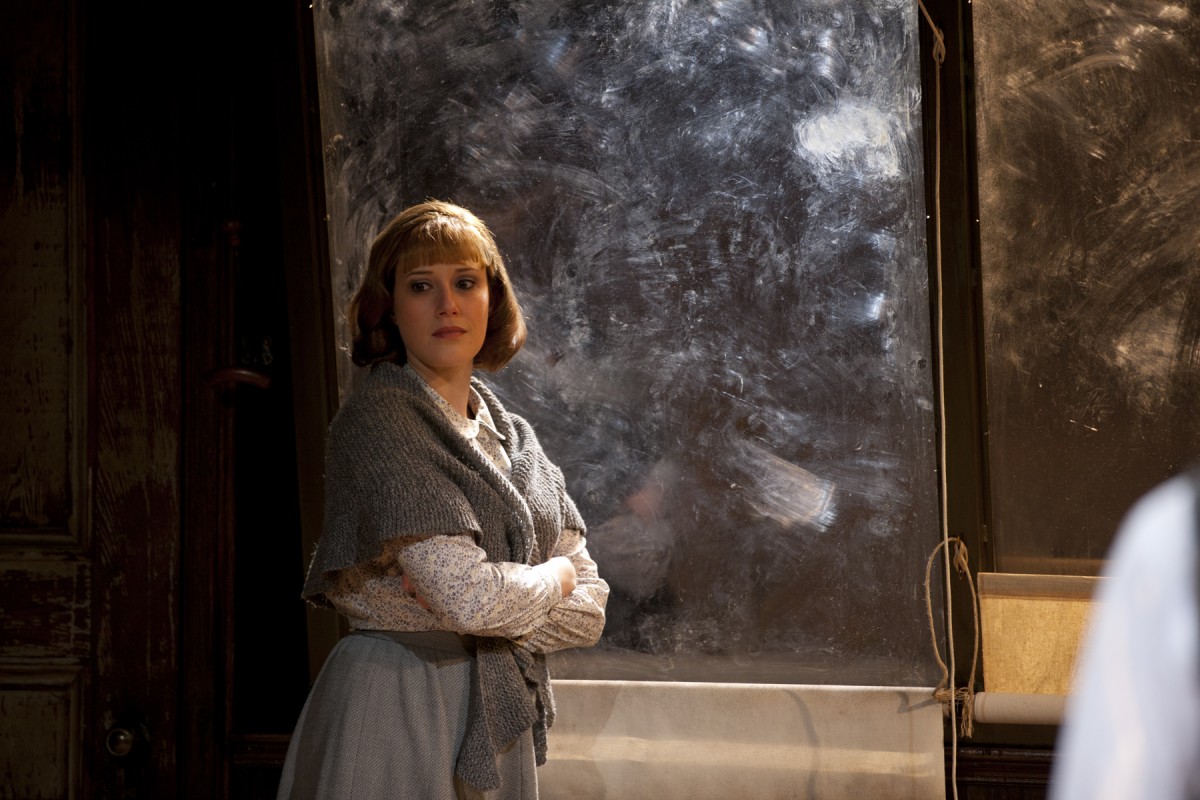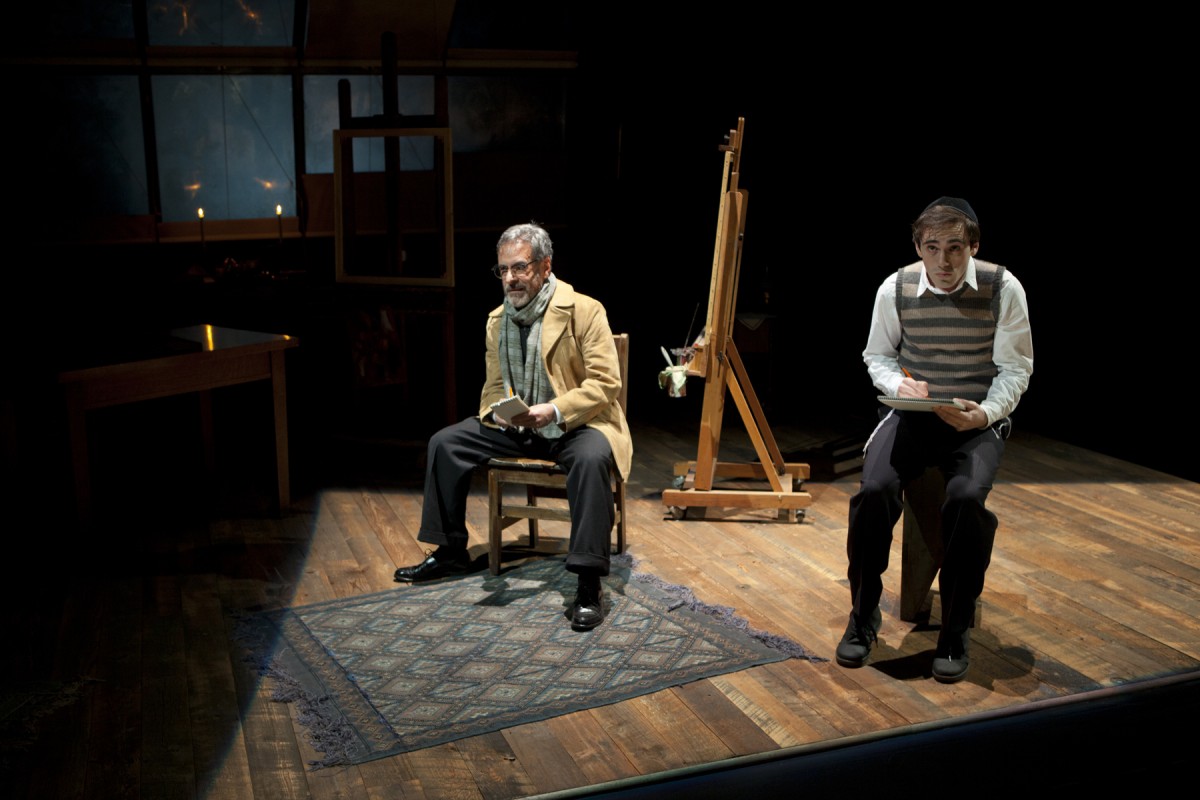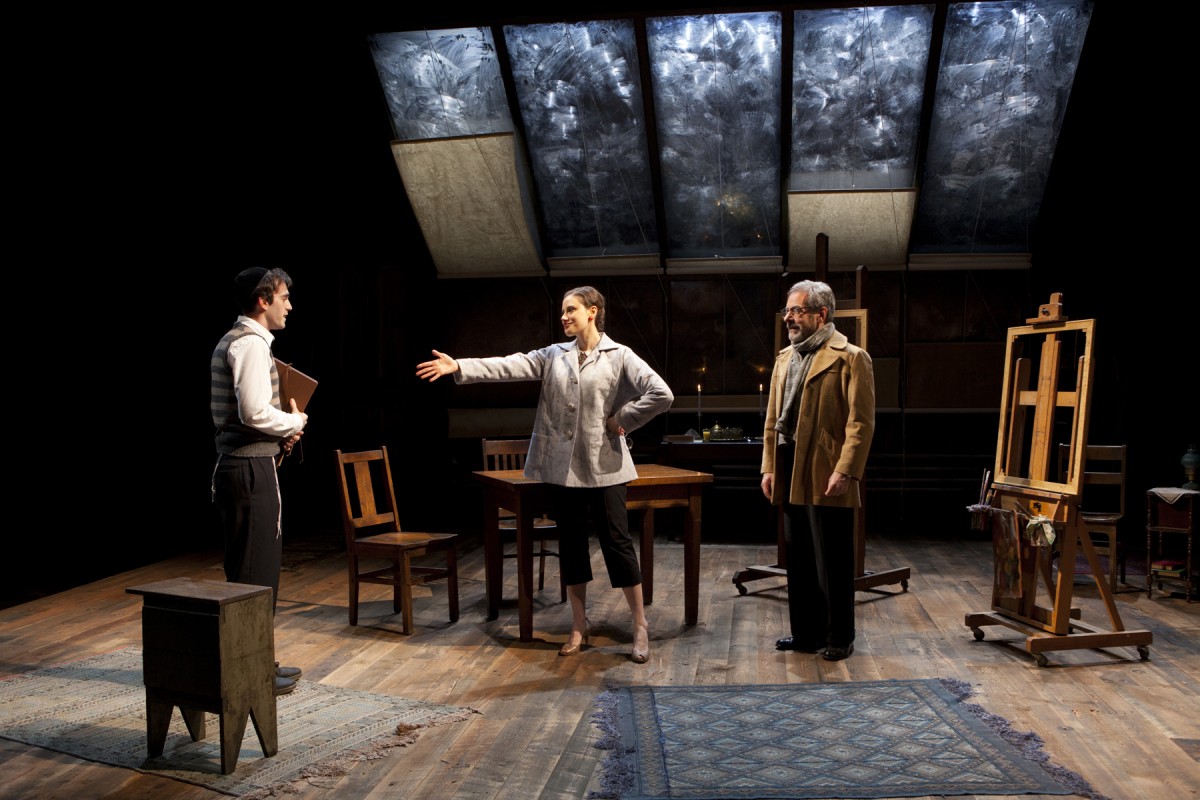Review of My Name is Asher Lev, Playhouse on Park
The clash of cultures is central to the drama of My Name is Asher Lev, adapted by Aaron Posner from the novel by Chaim Potok. Now playing at Playhouse on Park, directed by Joseph Discher, the story shows how a driven painter, Asher Lev, raised by orthodox Jewish parents, struggles to be understood by his people while becoming an artist in “the goyische style.” He paints nudes and crucifixions, subjects which are seen as a betrayal if not outright blasphemy.
Told by Asher himself in direct address to the audience, the story is fraught with disappointments and hopes, success and failure. Much of the early going has Asher recreating his viewpoint as a child, not really understanding why what he’s doing should be a cause for conflict. The play opens with the elder Lev appalled by his son’s drawings of “naked women” and blaming his wife for taking the boy to the art museum. We see how his mother and father are confused by Asher’s talent, recognizing his gift as a child but seeing little purpose for it. As Asher grows older, his father becomes even more dismissive, seeing drawing as a distraction from the important matters of life. The elder Lev serves the Jewish community’s leader, or Rebbe, and in the orthodox view only what the Rebbe approves can be meaningful.
Rivkeh Lev (Stefanie Londino), Asher Lev (Jordan Sobel), Aryeh Lev (Dan Shor) in the Playhouse on Park production of My Name is Asher Lev, directed by Jospeh Discher (photos by Meredith Longo)
At last, in preparation for his Bar Mitzvah, Asher has a meeting with the Rebbe himself who is more benign than might be expected (especially since Asher, as a child, drew a rather unflattering caricature of him). The Rebbe assigns the teenaged Asher to Jacob Kahn, a successful Jewish painter who becomes Asher’s mentor. The most lively aspects of the story are found in Asher’s apprenticeship to Kahn, whom he gradually comes to surpass as an artist. As Kahn says, he doesn’t take on a pupil unless he can “make a David,” referencing Michelangelo’s famous masterpiece. Asher lives up to that challenge, it seems, but manages to create a serious affront to his parents’ sensibilities.
A difficulty in Playhouse on Park’s production is Jordan Sobel’s performance as Asher. He seems too likeable and guileless, so forthright and naïve, that one is hard-pressed to see him as the major artist he becomes. He seems to remain the wide-eyed child amazed by his own gift and barely able to consider how he should regard the feelings of others or his larger obligations. We might see him as a willful child or as the possessor of a talent so large it can’t be suppressed, but all the darker elements of the story—having to do with Asher’s sense of his mother’s afflictions—are rarely given sufficient dramatic weight. The notion that Asher’s art is an invocation of Sitra Achra, or the evil side of human nature, is mentioned as if a school lesson outgrown.
Of the three actors—Sobel plays Asher, all other male roles are played by Dan Shor—Stefanie Londino fares best in making Asher’s mother, Rivkeh, take on dimensions that exist beyond Asher’s view. Otherwise, the characters all seem to be painted entirely in the colors he sees them in: the Rebbe is kindly and stern; Asher’s father is at times a caricature of bullying indifference or of mystified concern; Shor is best as Kahn if only because the artist is mercurial in his approach to his pupil, at times challenging and harsh, at other times fond and encouraging. We sense that Asher never quite grasps the full weight of Kahn’s relation to art.
The tone of the whole is of a sentimental recollection in which the parents seem touchingly or comically out of date; the difficulties between the parents, having to do in part with Rivkeh’s will to continue her deceased brother’s work, come across as a minor subplot. The gravitas that Potok employs as the tone proper to the weighty struggle of religion and art finds, in this adaptation, a much more genial portrayal.
Asher Lev (Jordan Sobel) and model (Stefanie Landino)
Discher’s vision of the play is not aided by David Lewis’ scenic design in the Playhouse thrust space. Much of the action would benefit from more freedom of movement, but in the early going many scenes occur around a table toward the back of the stage. Some of the seats in the wings are forced to regard these scenes through easels set on either side of the stage. The later scenes gain from taking place outside the Lev home, though, for a play that moves around in time and place, dictated by Asher’s memories, the action has a static quality.
In the end, the story of Asher Lev is of an artist trying to see the truth about himself. Since we can’t see his work, we can only view him in terms of his interactions with others. Though he seems satisfied with the story he tells, his audience may find themselves less so.
My Name is Asher Lev
By Aaron Posner
Adapted from the novel by Chaim Potok
Directed by Joseph Discher
Scenic Designer: David Lewis; Costume Designer: Lisa Steier; Sound Designer: Rider Q. Stanton; Lighting Designer: Joseph Beumer; Associate Lighting Designer: Justin Dudzik; Stage Manager: Mollie Cook; Props Master/Set Dresser: Pamela Lang
Cast: Stefanie Londino, Dan Shor, Jordan Sobel
Playhouse on Park
April 24-May 12, 2019








